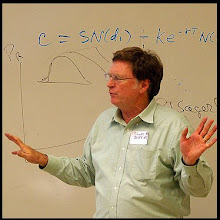
TENTATIVE SCHEDULE
3rd Biophysical Economics Conference Agenda
(TENTATIVE --- as of March 26)
Friday April 15th through Saturday April 16th
Moon Library conference room
SUNY College of Environmental Science and Forestry
Friday AM
Session I. Reviewing EROI and Updating the Data
9:00 Introduction: What we are trying to do by Charles Hall
9:05 Twenty new studies of EROI for Sustainability Journal by Charles Hall Environmental Sciences, SUNY ESF
9:15 Towards a Consistent yet Flexible EROI Protocol by David Murphy and Charles Hall Environmental Sciences, SUNY ESF
9:45 New Assessment of EROI for the US back to 1919
by Megan Guilford, Charles Hall Environmental Sciences, SUNY
Pete O’Conner and Cutler Cleveland Energy & Env. Boston Univ.
10:15 EROI for Norwegian oil and Gas by Leena Grandell, Michael Hook Univ. Uppsala, Charles Hall
10:45 Does EROI determine fuel prices? by Carey King, Jackson School of Geosciences Univ. Texas, Charles Hall
11:00 Net Energy Yield ofRenewable Energy Resources by Mik Dale Energy and Resources Stanford Univ.
11:30 Bottom up EROI analysis by Adam Brandt Energy and Resources Stanford Univ.
12:00 EROI Summary
12:15 Brief advertisement for our new book “Energy and the wealth of nations” Charlie & Kent & David Packer
12:20 Discussion (continues through lunch)
Catered Lunch (about $8-10)
Session II. Energy cost of materials and their impacts (1:30 -3:00)
1:30 Energy Costs of Materials Associated with Thin-Film PV by Ajay Gupta Environmental Sciences, SUNY ESF
3:30 Discussion
Keynote Presentation (4:00-6:00) (In 146 Baker Lab, down the steps).
Putting the Mocando Gulf of Mexico Oil spill into historical perspective by Joe Tainter Former Chair Natural Resources, Univ Utah
Friday Night (Optional: Times /places to be arranged):
“A primer on Net Energy and Economics” by George Mobus Computer Science Univ Washington
Second Annual BFE SKIL Talk, "On underestimating the overpopulation problem and
overestimating the power of our actions to address it”. by Jack Alpert Director Stanford Knowledge Integration Laboratory
Saturday AM:
Session III. New perspectives on Economics
9:00 Peak Oil and Liebig's Law of the Minimum: Some implications for employment and a sustainable economy by Gail Tverburg The Oil Drum
9:30 Oil, gas and the future of renewables by Steven Kopits Managing Director, Douglass Westwood
10:00 Further critiques of conventional economics" by Lisi Krall Dept. Economics SUNY Cortland
10:30 (No title yet) by Hannes Kunz Director Institute for Integrated Economic Research, Zurich
11:00 Biophysical Economics and the Social Structure of Accumulation. by Kent Klitgaard Economics Wells College
11:30 Swedish Examples of Biophysical Economics by Kristian Skanberg
12:00 Discussion
Catered Lunch (about $8-10)
Saturday PM:
Session IV. Economic/environmental impacts of EROI
1:00 Net Power vs. Net Power: transition (aka transaction) costs in deploying energy technologies by Robert Herendeen Gund Institute Univ. Vt.
1:30 Institutional challenges for watershed management and sustainability in the Caraga Region, Philippines” by Sarah Herbst Michigan State
Session V. Round Table Discussion (2:00-4:30 )
“The relation of Peak Oil, EROI, and Biophysical economics to the future of our financial system and repercussions for governments, businesses and individuals" by
Sam Hopkins (Moderator): Activist for better public understanding of financial & economic systems; founder, Hopkins & Associates
Chip Barnes: Financial markets trader; founder, DataTel, Inc.; real estate investor
Jim Gray: Political consultant & campaign manager; associate of Asset & Equity Corp.
Jim Case: Mathematician; mathematics of finance; founder, Chesapeake Cider Co.; economist at API; & engineer at McDonnell Aircraft
Andy Groat: Financial Consultant, Ridgeway Conger (Registered Investment Advisor
4:30 Discussion
5:00-5:30 Wrap up with James Kunstler
(If you have never heard James Kunstler you have a treat coming!)
Sunday AM: Finger lake trip, breakfast, possible wine tour



